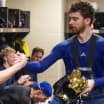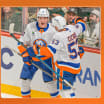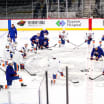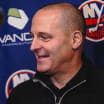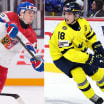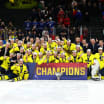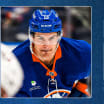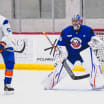As the Islanders Head Coach -- succeeding iconic Al Arbour -- Terry Simpson had his work cut out for him as the 1988-89 season approached; of that there could be no doubt.
One by one the Four-Cup Dynastic heroes were exiting the roster; some like Mike Bossy, with injuries; others such as captain Denis Potvin, because Father Time had caught up with him.
Maven's Memories: Goodbye Terry, Hello Al
Stan Fischler recounts Al Arbour's return to the Islanders in the 88-89 season
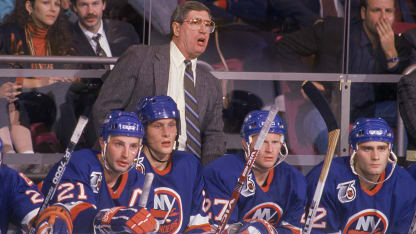
© B Bennett/Getty Images
By
Stan Fischler
Special to NHL.com
"The Stanley Cup years are long gone," said the architect of champions, Bill Torrey. "Now we're re-loading our guns and have to see how the new players perform."
One of the rookies was an oddity of sorts since he survived a cloak-and-dagger, melodramatic defection from his home in Czechoslovakia.
David Volek was the mysterious man of the hour who pulled a fast one on his former Czech masters to become an Islander. Of course, the adventure was unknown to most of the world while it was playing out in Europe.
The fast forward's ploy was to visit his father, a hockey coach in West Germany. Once there, David hugged his dad good-bye, linked up with agent Ritch Winter in Munich and together they jetted to Canada -- and eventually Uniondale.
Bow Tie Bill signed dauntless David to a contract and introduced his discovery to coach Simpson. Deadpanning his newest offensive weapon, the coach asked Volek how many goals he might score as an NHL freshman.
"Thirty," Volek shot back.
"Thank you very much," Terry countered, "but I'll settle for 25."
Volek then was presented with an Islanders jersey. On the back of it two numbers were emblazoned, 25!
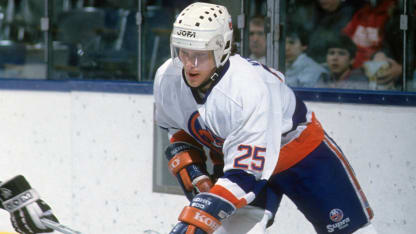
© B Bennett/Getty Images
Meanwhile, Torrey's attention was turned to his bench. When Bob Nystrom rejected a chance to coach an Islanders minor league affiliate, Bill imported a Simpson protege from Western Canada, Rick Wilson.
That done, Bow Tie Bill then focused on a core of seven pivotal players who were entering the option years of the contracts. The two most important ones were future Hall of Famer Pat LaFontaine and crack netminder Kelly Hrudey.
Others included forwards Allan Kerr, Brad Lauer, Randy Wood and Bob Bassen as well as defenseman Ken Leiter.
Torrey: "We have to see how these players perform. If they're not going to do it, we're gonna have to seek other remedies. I'm dissatisfied with our performance the last couple of years. We could have accomplished more."
Torrey didn't mention the head coach by name but the implication was clear that Terry Simpson would have to get more out of his stickhandlers than a desultory playoff effort.
There were issues, to be sure. For one thing, Simpson's offense was top-heavy or, as one media wag put it, "The Islanders are a helicopter team -- no wings."
The center position was loaded. In addition to LaFontaine, Simpson could call on another future Hall of Famer, Bryan Trottier, as well as hard-nosed captain Brent Sutter and fiery little Bobby Bassen.
A further blow was felt before the 1988-89 season began when Mike Bossy's bad back prevented his comeback. "I'd hoped that over the summer my back would stop hurting," Mike allowed. "It didn't so I decided to retire."
As for Simpson's job turning a bit shaky, his unplanned "retirement" would take a few months longer. Torrey began thinking about pulling the chute on Terry after watching his club get clobbered 8-1 by the Winnipeg Jets at the Coliseum.
If Bow Tie Bill needed any further confirmation about Simpson's status it was supplied during an eight-game losing streak that included an 8-0 whomping by the Blues in St.Louis.
Torrey finally supplied Simpson with the pink slip on December 6, 1988.
Finding a replacement was as easy as opening the office next door and placing the name AL ARBOUR on the panel.
Arbour: "I never thought I'd be back but Bill called and asked me to help, so I agreed. I felt I owed it to him and the team for all he's done for me. But I'm still in shock."
Not Torrey. His team's flopperoo had been the required S.O.S. And while he lauded Simpson's "dedication," the GM perceived the same problem that Terry had diagnosed but could not solve.
"I really hope that Al can give them the confidence that I couldn't," said Simpson before driving west on Hempstead Turnpike to JFK Airport.
Simpson paused for a brief moment and then added a further telling analysis of his failure: "The scenario of the four Stanley Cups was a burden for a young team trying to find its legs."
On top of all the losing there was Lady Luck's refusal to cooperate. One of the young hopes, Mikko Makela, could not find his game and defenseman Dean Chynoweth was felled by a bone disease.
When it became apparent that a playoff berth was out of the question, Torrey went to the market place. He told his managerial foes that Kelly Hrudey could be had for the right price.
Torrey: "It's a gamble but -- as great as Kelly is -- look at where we're at."
On February 22, 1989, Hrudey was dealt to the Los Angeles Kings. In return, the Isles received two top prospectus, goalie Mark Fitzpatrick and defenseman Wayne McBean.
More deals included sending D-man Tomas Jonsson to Edmonton and Greg Gilbert to Chicago for draft picks. Meanwhile, Arbour discovered what his predecessor Simpson experienced; a not very good team.
The Isles finished the season with a mark of 28-47-5 which did not produce a playoff berth but some smidgen of hope among the newcomers, especially in goal where either Mark Fitzpatrick or Jeff Hackett would replace Bill Smith.
Rough and ready Rich Pilon emerged as an intimidating defenseman and Czech escapee David Volek was named to the NHL's All-Rookie team. At center, Tom Fitzgerald and Rob DiMaio impressed Arbour with their grit.
As if to put a final coda on the 1980s glittering roster, both Ken Morrow and Bill Smith said adieu to their respective careers with the Islanders.
"'Battlin' Billy was one of the finest playoff goalies of the modern age," wrote historian Andrew Podnieks in his who's who of hockey, Players. "Smith's forte really wasn't his goals against average or shutouts.
"It was simply allowing fewer goals than the guy at the other end. He also controlled the area in front of the net with greater vigor than anyone previously. His playoff record, 88-36 was one of the best win percentages since 1967."
As for Morrow, Podnieks praised Ken's "talent, determination, reliability and clutch scoring."
Although 1988-89 ended on a sour note, Torrey was able to look beyond the blue horizon and see a hopeful next season ahead.
"Al is enthused and so am I," Bow Tie Bill concluded. "I can see a playoff team just around the corner."
Nobody could be sure during the summer of 1989, but Torrey was right about Arbour and the revitalized Radar was right for the Islanders!
LISTS: FOUR GOOD THINGS ABOUT A NOT-SO-GOOD SEASON
1. ARBOUR ANSWERED THE S.O.S.:When Terry Simpson failed, Bill Torrey needed a reliable replacement. When Bow Tie Bill asked Radar to return, Al returned the favor and did.
2. PROMISING YOUTH:David Volek proved to be a solid rookie up front while Rich Pilon exuded the brand of toughness so badly needed behind the blue line. Tom Fitzgerald showed positive signs as a checking center.
3. YOUNG LEADERSHIP:Pat LaFontaine and Brent Sutter provided the Islanders with as solid a one-two center-ice combination as any in the NHL at the close of the decade.
4. SMITTY'S SUCCESSORS:Both youthful puck-stoppers, Jeff Hackett and Mark Fitzpatrick showed promise; especially Fitz, the smiling redhead.

